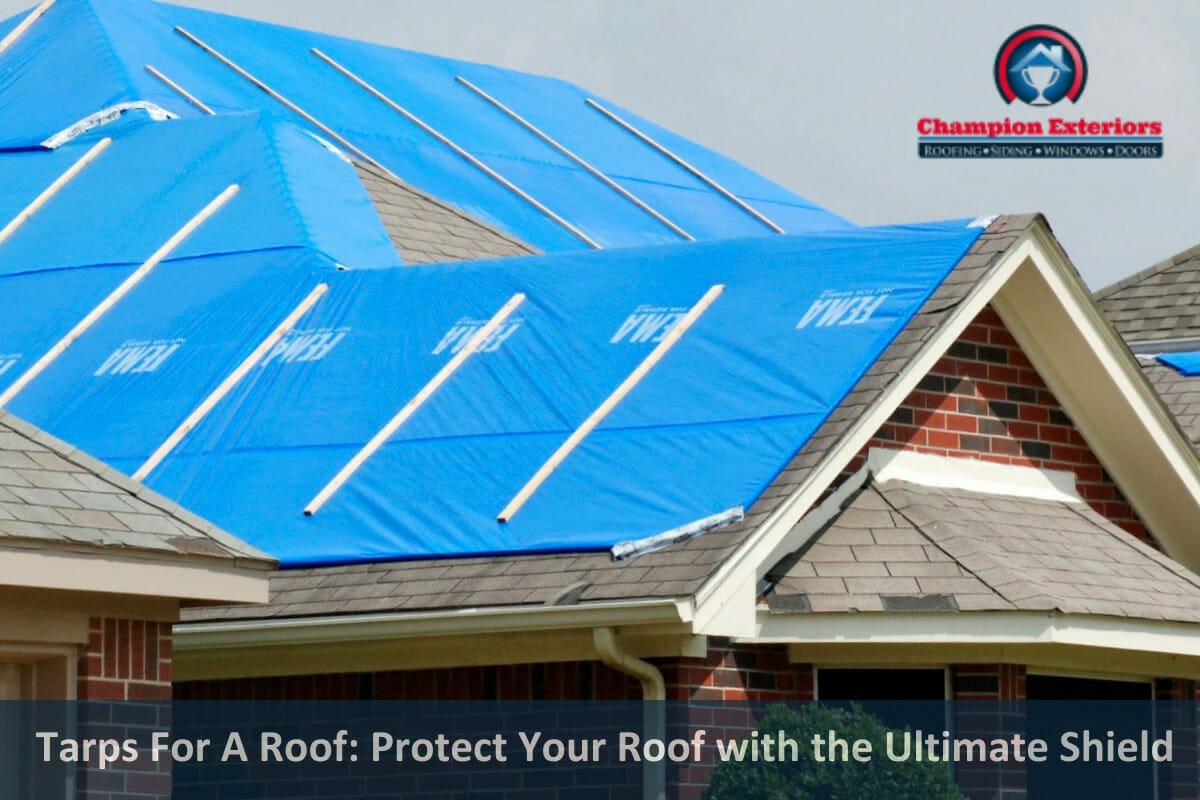Whether your roof has just experienced storm damage or is under construction, tarps make a great cover against water leaks, falling debris, and moisture. Tarpaulins, otherwise known as tarps, are made of different materials for different needs, but all tarps serve the same purpose of covering homes or materials from water leaks, dust, dirt, and grim.
This blog post covers everything you need to know about the best roof tarps available. Read this post and learn the factors that will aid you in making a purchase decision.
The 7 Best Roof Tarps To Consider
1. Vinyl Tarps
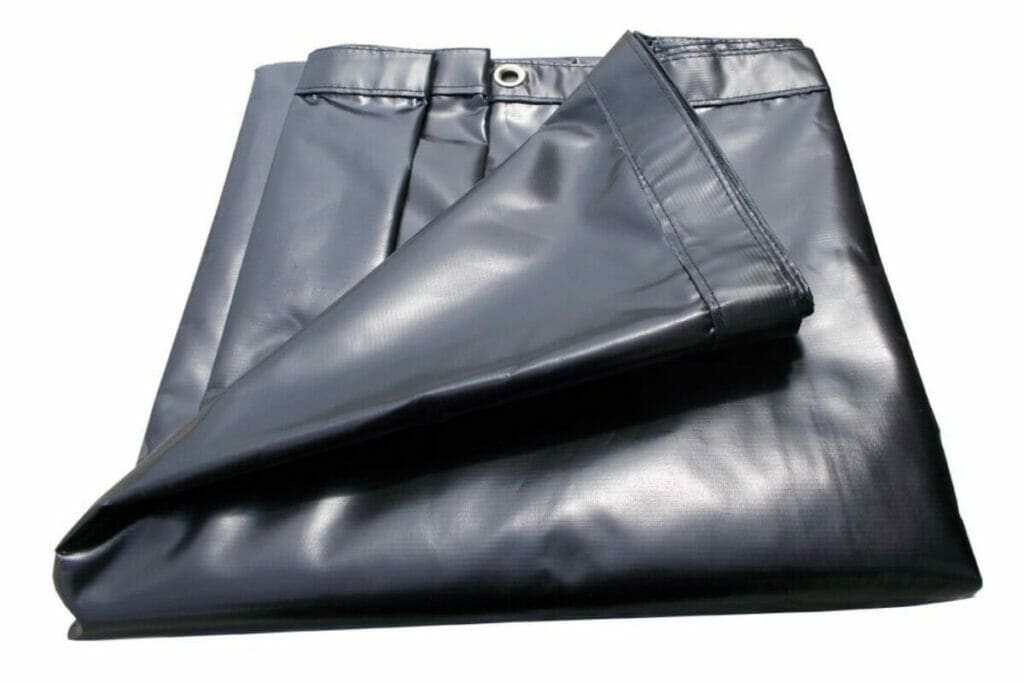
Made of polyvinyl chloride, vinyl tarps are one the most widely used tarpaulins for industrial and residential purposes. They are long-lasting and durable enough to stand against weather conditions like rain and high winds. You can use tarps as a temporary solution for roof damage until the roofer is available to make permanent repairs.
These tarps come in various sizes, colors, weights, grades, and thicknesses. Depending on the severity and size of the damage, you’ll be able to find a vinyl tarp to cover the damage. In addition, they are easy to clean and maintain, as they are made of a plastic-like or a polymer material.
2. Polyethylene Tarps
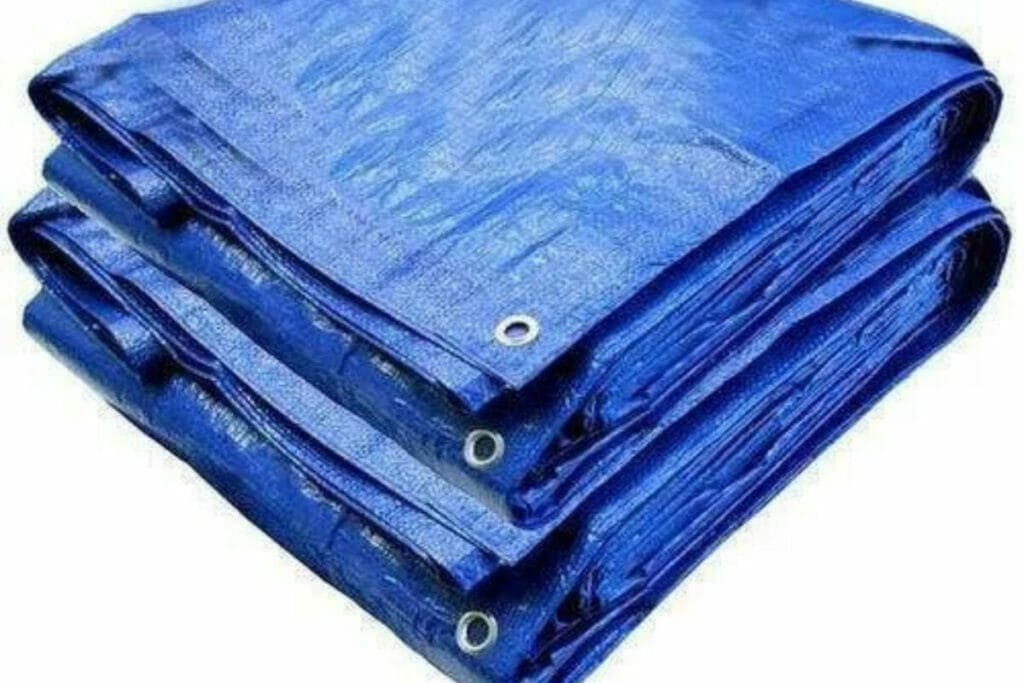
Polyethylene tarps, also known as poly tarps, are popular among homeowners and construction workers. Due to the resilient and durable polymer they’re made of these tarps are waterproof and hold up strong against water infiltration. Polyethylene tarps are widely used for various outdoor applications, including as a temporary cover for roofs, boats, and other outdoor equipment.
They are available in various colors, sizes, and thicknesses and can be easily customized to fit specific needs. Polyethylene tarps are also relatively lightweight, making them easy to handle and transport. Also, they make a cost-effective and resilient option for building owners and construction workers.
3. Canvas Tarps
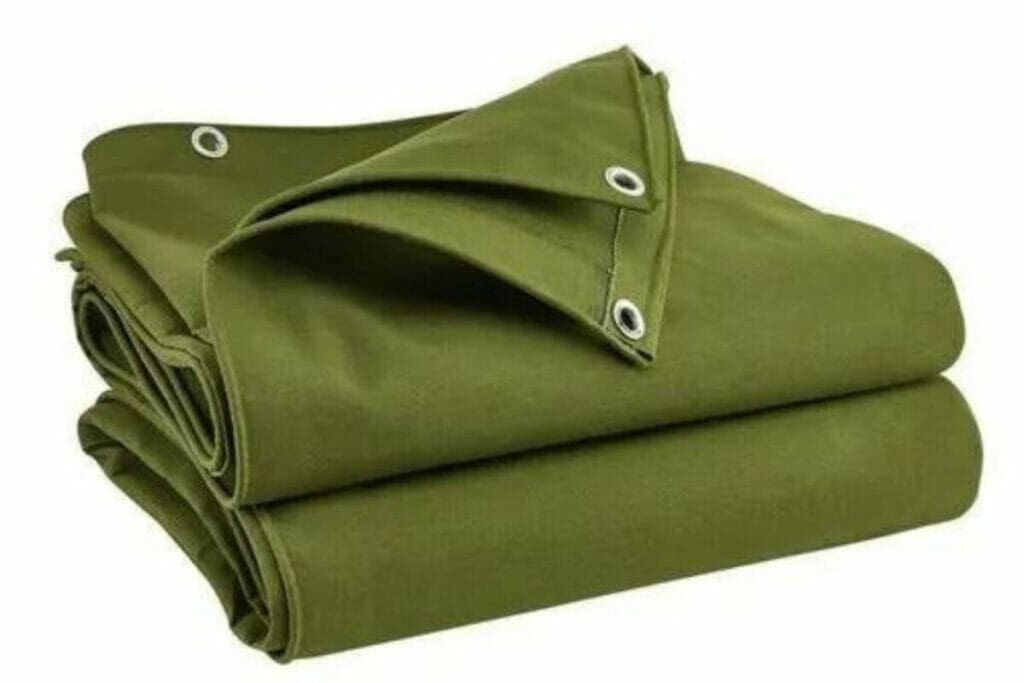
Canvas tarps are a type of tarpaulin made from a heavy-duty, plain-woven fabric material called canvas. Although it can also be made of other natural or synthetic fibers, the canvas is typically made of cotton. The material is strong, durable, and breathable, making it ideal for outdoor applications. Canvas tarps are commonly used for various purposes, including as a temporary cover for roofs, as ground covers, and for equipment storage.
They are also commonly used for industrial and commercial purposes, such as construction and transportation. Canvas tarps are available in different sizes and colors and can be treated with various coatings to increase their resistance to water, mildew, and UV rays. They are a popular choice for long-term outdoor protection due to their durability and resistance to the elements.
4. Emergency/Blue Tarps
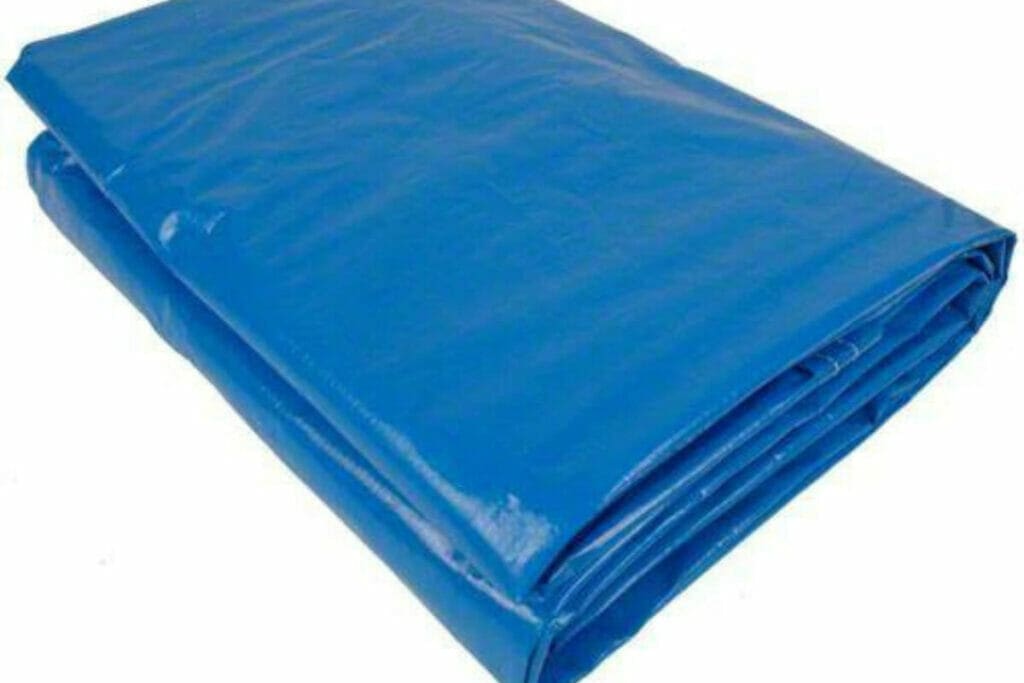
Blue tarps can be used as emergency tarps, but they’re not all specifically designed for emergencies. Blue tarps are polyethylene tarps often used for temporary solutions, such as tarping roofs or protecting belongings. They are available in a variety of sizes and thicknesses.
While they can be used in emergencies, it’s important to choose a tarp that is appropriate for the specific situation and strong enough to withstand the elements. Some blue tarps are specifically marketed as emergency tarps. They are designed to be more durable and resistant to tearing and UV damage, making them better suited for long-term use in emergencies.
5. Clear PVC Tarps
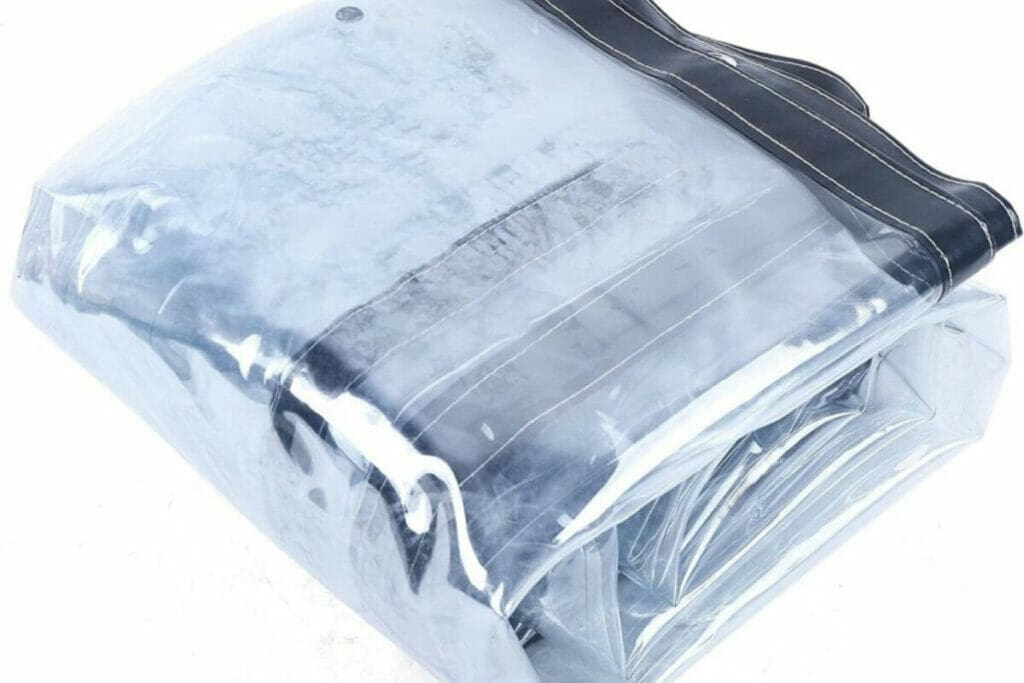
Clear PVC tarps are a heavy-duty polyvinyl chloride (PVC) material that is transparent or semi-transparent, which means you can see through them. These tarps are commonly used in outdoor applications where a clear or transparent cover is needed. Clear PVC tarps are waterproof and UV resistant, making them suitable for use as a protective cover for roofs, particularly when natural light is desired or when aesthetics is a consideration.
However, it’s essential to ensure that the clear PVC tarp is securely fastened to the roof to prevent it from being blown away by wind or other adverse weather conditions.
6. Polyester Tarps
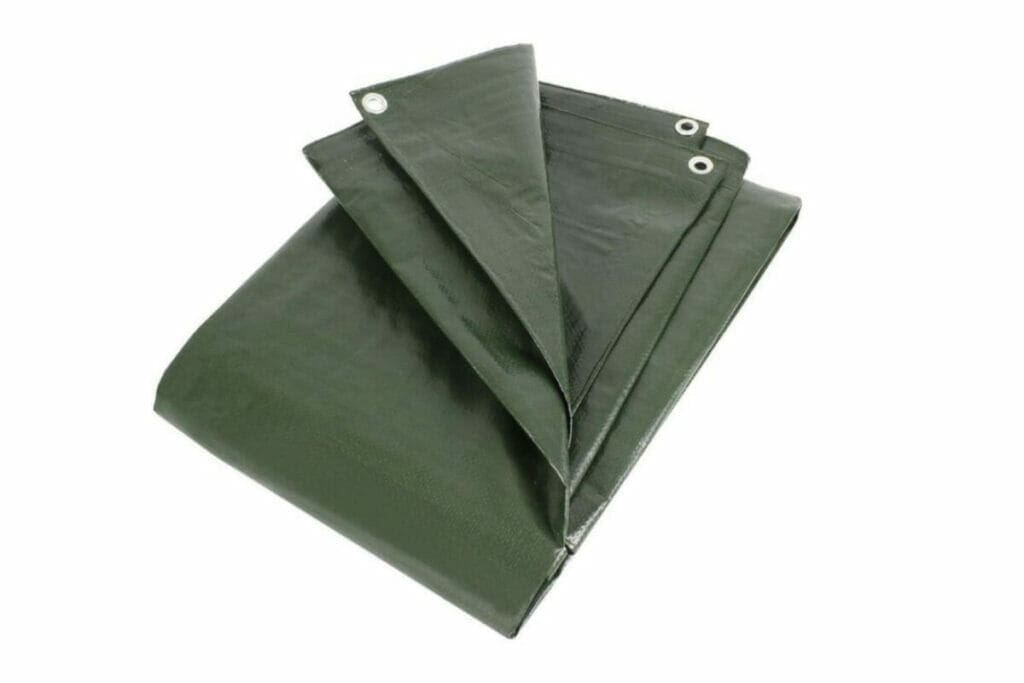
Polyester is a polymer made from synthetic fiber derived from petroleum. Since it is waterproof, tear-resistant, and durable, it is most commonly used for roof tarping and industrial applications. Its UV and tear resistance makes it an eligible candidate for many outdoor needs, including tarping trucks and boats and preventing rain from entering.
However, polyester fabrics are non-biodegradable and take decades to break down in the environment, which is something to note if you’re an eco-conscious buyer. The properties of polyester promote pollution rather than ceasing it, but with proper manufacturing and disposal, the negative effects of polyester can be minimized.
7. Wind-Resistant Tarps
Wind-resistant tarps are designed for areas that have regular hurricanes that cause roof storm damage to occur. They are thicker and heavier to resist wind gusts trying to blow them off the roof. Vinyl-coated polyester tarps are considered wind resistant as they are thicker, heavier, and resistant to water as well. In other words, no matter how hard the wind blows, wind-resistant tarps are made to withstand them. Also, because of their heavy-duty nature, these tarps can be installed in areas where better insulation against water and wind is required.
Factors To Consider When Choosing the Right Roof Tarp
While choosing the right tarp for your roof can be daunting, the following factors can help narrow your options and make the decision easier.
Material: Consider the type of material that is best suited for your needs, whether it’s canvas, polyethylene, PVC, or another material.
Size: The size of the tarp is another factor to consider. Measure your roof to ensure that you purchase a tarp that will cover it fully, or the area of damage adequately.
Thickness: The thickness of the tarp is also important. A thicker tarp will provide better protection and last longer than a thinner one.
UV Resistance: If your tarp will be exposed to the sun, ensure it has UV protection to prevent fading and deterioration.
Water Resistance: Choose a water-resistant tarp to protect your roof from rain and other forms of moisture.
Wind Resistance: If you live in an area with strong winds, choose a tarp that is designed to withstand high winds.
Durability: Look for a tarp that is durable and can withstand harsh weather conditions.
Give Your Roof Additional Protection With Our Professional Assistance
While tarps can help you temporarily fix roof damage, a permanent and reliable repair or replacement can increase your roof’s lifespan. If your roof is damaged, you must call professional roofers to sort things out for you. If you live in Villas, Hainesport, or the surrounding areas in New Jersey, call Champion Exteriors now at (609)-845-3576 for a roof repair or replacement.


